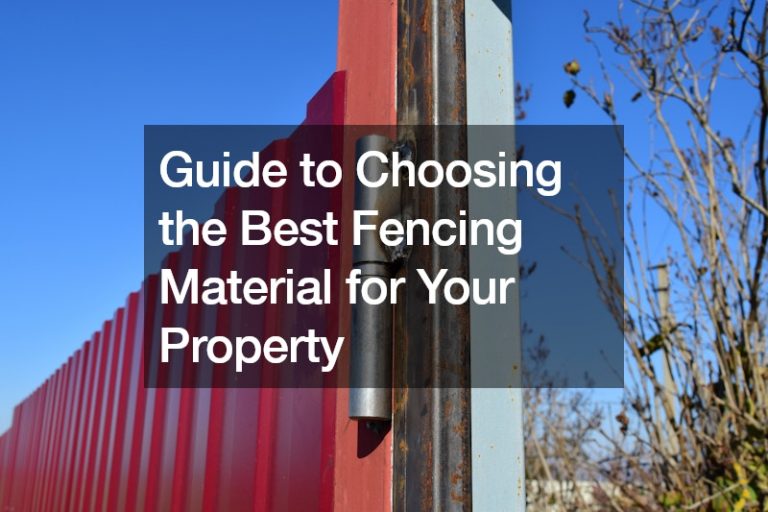Choosing the right fencing material for your property is an important decision that can affect your home’s security, privacy, aesthetic appeal, and overall value. With so many options available, it can be challenging to determine which material best suits your needs and preferences. This guide will help you understand the different types of fencing materials and their benefits, so you can make an informed decision and find the best fence contractors for your project.
Understanding Your Needs
Before you start exploring fencing materials, it’s essential to understand your specific needs and priorities.
Ask yourself the following questions:
What is the primary purpose of the fence? Is it for privacy, security, aesthetic enhancement, or a combination of these factors?
What is your budget? Some materials are more expensive than others, so understanding your budget constraints is crucial.
How much maintenance are you willing to do? Different materials require varying levels of upkeep.
What style do you prefer? The appearance of your fence can significantly impact your property’s curb appeal.
Once you have a clear understanding of your needs, you can start exploring the different fencing materials available.
Types of Fencing Materials
1. Wood Fencing
Wood is a classic and popular choice for fencing due to its natural beauty and versatility. It can be stained or painted in various colors to match your property’s aesthetic. Common types of wood used for fencing include cedar, pine, and redwood.
Pros:
Aesthetic appeal: Wood fences offer a natural, timeless look.
Customizable: Easily painted or stained to match your preferences.
Privacy: Solid wood panels provide excellent privacy.
Cons:
Maintenance: Requires regular maintenance, including staining or painting and occasional repairs.
Durability: Can be susceptible to rot, pests, and weather damage.
2. Vinyl Fencing
Vinyl fencing is a low-maintenance alternative to wood. It’s available in various styles and colors, mimicking the appearance of wood without the upkeep.
Pros:
Low maintenance: Requires minimal upkeep and is easy to clean.
Durability: Resistant to rot, pests, and weather damage.
Variety: Available in many styles and colors.
Cons:
Cost: Initially more expensive than wood.
Appearance: Some people prefer the look of natural wood over vinyl.
3. Aluminum Fencing
Aluminum fencing is known for its durability and minimal maintenance. It’s often used for decorative purposes, such as garden fences or around pools.
Pros:
Durability: Resistant to rust and corrosion.
Low maintenance: Requires minimal upkeep.
Aesthetic: Offers an elegant, classic look.
Cons:
Privacy: Does not provide much privacy unless combined with other materials.
Strength: Not as strong as other materials like steel or wrought iron.
4. Chain Link Fencing
Chain link fencing is a practical and cost-effective option for both residential and commercial properties. It’s commonly used for security purposes.
Pros:
Cost-effective: Generally more affordable than other materials.
Durability: Resistant to weather and pests.
Low maintenance: Requires little upkeep.
Cons:
Aesthetics: Offers a utilitarian look that may not suit all properties.
Privacy: Provides little to no privacy without the addition of slats or vegetation.
5. Wrought Iron Fencing
Wrought iron fencing is known for its strength and elegant appearance. It’s often used for high-end properties and historical homes.
Pros:
Aesthetic: Offers a sophisticated, classic look.
Durability: Extremely strong and long-lasting.
Security: Provides excellent security.
Cons:
Cost: Generally more expensive than other materials.
Maintenance: Requires regular maintenance to prevent rust and corrosion.
6. Composite Fencing
Composite fencing is made from a blend of wood fibers and plastic. It offers the appearance of wood with the low maintenance of vinyl.
Pros:
Aesthetic: Mimics the look of wood.
Low maintenance: Resistant to rot, pests, and weather damage.
Durability: Long-lasting and strong.
Cons:
Cost: Typically more expensive than wood and vinyl.
Color fading: Can fade over time with prolonged sun exposure.
Choosing the Right Fence Contractors
Selecting the right fence contractors is as important as choosing the right fencing material. Here are some tips to help you find reliable professionals:
Experience: Look for contractors with extensive experience in installing the type of fence you want.
Reputation: Check reviews and ask for references to gauge the contractor’s reliability and quality of work.
Licensing and Insurance: Ensure the contractor is licensed and insured to protect yourself from liability.
Estimates: Get multiple quotes to compare pricing and services.
Warranty: Ask about warranties on both materials and workmanship.
Conclusion
Choosing the best fencing material for your property involves considering your needs, budget, and aesthetic preferences. By understanding the pros and cons of different materials and selecting reputable fence contractors, you can ensure a successful fencing project that enhances your property’s value, security, and appearance. Whether you opt for the natural beauty of wood, the low maintenance of vinyl, or the durability of aluminum, the right fence will provide you with years of satisfaction and peace of mind.
.


